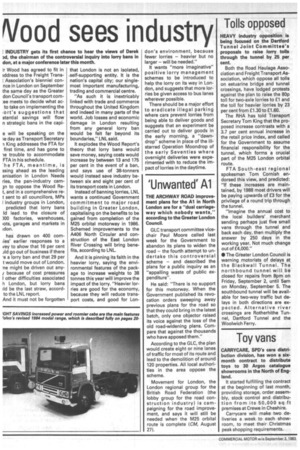Vood sees indust
Page 6

If you've noticed an error in this article please click here to report it so we can fix it.
: INDUSTRY gets its first chance to hear the views of Derek 3d, the chairman of the controversial inquiry into lorry bans in don, at a major conference later this month.
Ir Wood has agreed to fit in Iddress to the Freight Trans: Association's bienniel connce in London on September the same day as the Greater don Council's transport com:ee meets to decide what acto take on implementing the ort's suggestions that stantial savings will flow n strategic bans in the capi
e will be speaking on the le day as Transport Secretary -1 King addresses the FTA for first time, and has gone to le trouble to accommodate FTA in his schedule.
'he FTA, meantime, is ssing ahead as the leading anisation in London Needs ries, the pan-industry camp to oppose the Wood Ret, and in a comprehensive ret sent to all councillors, MPs I industry groups in London, predicted that lorry bans Id lead to the closure of )00 factories, warehouses, lots, garages and markets in 'don.
has drawn on 400 cornlies' earlier responses to a vey to show that 16 per cent iLd go out of business if there -e a lorry ban and that 29 per t would move out of London. ne might be driven out any" because of cost pressures I other difficulties associated h London, but lorry bans iId be the last straw, accordto the LNL report.
And it must not be forgotten that London is not an isolated, -self-supporting entity. It is the nation's capital city; our singlemost important manufacturing, trading and commercial centre.
"As such it is inextricably linked with trade and commerce throughout the United Kingdom and indeed in many parts of the world. Job losses and economic damage in London resulting from any general lorry ban would be felt far beyond its boundaries," LNL said.
It explodes the Wood Report's theory that lorry bans would save money, saying costs would increase by between 13 and 175 per cent in the event of a ban, and says use of 38-tonners would instead save industry between six and eight per cent of its transport costs in London.
Instead of banning lorries, LNL wants a continued Government commitment to major road building in Greater London, capitalising on the benefits to be gained from completion of the M25 orbital motorway in 1986. Schemed improvements to the A406 North Circular and construction of the East London River Crossing will bring benefits, according to LNL.
And it is pinning its faith in the heavier lorry, saying the environmental features of the package to increase weights to 38 tonnes this year will improve the impact of the lorry. "Heavier lorries are good for the economy, because they will reduce transport costs, and good for Lon don's environment, because fewer lorries — heavier but no larger — will be needed."
It wants "more imaginative" positive lorry management schemes to be introduced to help the lorry on its way in London, and suggests that more lorries be given access to bus lanes wherever possible.
There should be a major effort to eradicate illegal parking where cars prevent lorries from being able to deliver goods and suggests that an experiment be carried out to deliver goods in the early morning, a "dawndrop" scheme in place of the IIIstarred Operation Moondrop of the early Seventies where overnight deliveries were experimented with to reduce the impact of lorries in the daytime.
























































































































